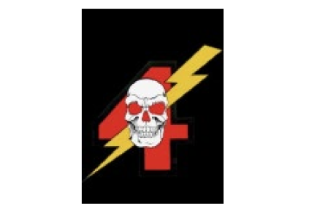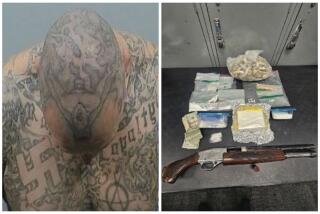2 Officers Posing as Hells Angels Aided U.S. Probe
- Share via
SAN FRANCISCO — One day after the arrests of dozens of members of the Hells Angels, the federal Bureau of Alcohol Tobacco, Firearms and Explosives revealed Thursday that two law enforcement officials had gone undercover posing as members of the organization for more than two years.
An undercover ATF agent, described by a spokesman as “an outstanding individual,” became “a full-patched member” of the Hells Angels. His infiltration and that of a law enforcement official from Arizona aided in Wednesday’s arrests and the 85 search warrants that were served on members in five states. About 700 federal, state and local agents assisted in the predawn raids.
Many of the 57 arrested were from San Francisco, Ventura County and the San Fernando Valley.
In documents released Thursday in federal court in Las Vegas, the Hells Angels Motorcycle Club is accused of engaging in racketeering activities involving conspiracy to commit murder, conspiracy to collect credit through extortion, conspiracy to interfere with commerce through “threats of violence [and] robbery,” and conspiracy to distribute methamphetamines and marijuana.
Though the Hells Angels have sought to clean up their reputation in recent years -- sponsoring toys-for-tots campaigns, for example -- the federal indictment describes an organization that rules by fear and intimidation. The organization has 2,500 members in 23 states and 25 countries, federal officials said.
Although this may not be the first time that a federal agent has infiltrated the Hells Angels, ATF spokesman Marti McKee said, “It’s extremely unusual to be able to do it.”
But Los Angeles lawyer Barry Tarlow, a former assistant U.S. attorney who has represented individual members of the Hells Angels for 25 years, dismissed law enforcement’s efforts.
“It’s a great deal of puffing to make them look important,” Tarlow said. “They’re wasting taxpayer money chasing people around who have a nontraditional lifestyle, the lifestyle of a pirate -- not of a criminal.”
“On all these Hells Angels cases, and in my own experience,” said Hells Angels national spokesman George Christie, a Tarlow client, “they start out with a big bang and wind up a puff of smoke.”
Wednesday’s arrests stem from a fight between the Hells Angels and their archenemy, the Mongols, another motorcycle club, in April 2002 during the Laughlin River Run, an annual event in Laughlin, Nev. After numerous skirmishes, the two clubs clashed near Rosa’s Cantina, a bar near the casino pit at Harrah’s Laughlin. As surveillance videos captured the fight, Hells Angels assaulted Mongols with guns, knives, hammers and wrenches and, according to federal filings, “sought to murder or seriously injure Mongols.” One Mongol and two Hells Angels were killed.
After that melee, a Hells Angel was shot to death about 115 miles west of Laughlin.
According to the indictment, the Hells Angels create a climate of fear by assaulting members of rival motorcycle gangs, especially the Mongols.
And they keep “victims, potential informants and witnesses and the public at large in fear ... through threats of violence and violence.”
Despite the arrests, one official who asked to remain anonymous said the probe would not stop other Hells Angels from engaging in illegal activities.
“This was a significant operation,” the official said. “But we have not broken the back of the gang.”
More to Read
Go beyond the scoreboard
Get the latest on L.A.'s teams in the daily Sports Report newsletter.
You may occasionally receive promotional content from the Los Angeles Times.






